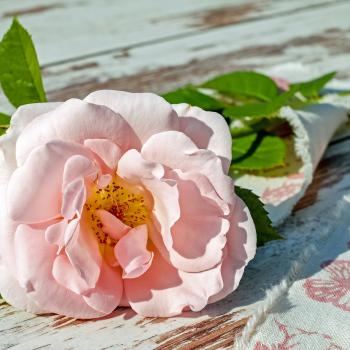So with her father’s blessing light upon her, she rode away beside the prince; and ever after, all her life was crowned with happiness as it had been written for her in the stars.
In part I of this series I gave some background to Annie Fellows Johnston’s 1904 short story The Three Weavers. In part II, I posted the first part of the story, in which three weavers—Herthold, Hubert, and Hildgardmar—who live side-by-side and have similar fortunes, had three infant daughters—Hertha, Huberta, and Hildegard. At each girl’s christening, a fairy appeared and declared that the girl would marry a prince—if she could weave him a royal mantle. The three fathers rejoiced over the news before deciding to take three very different courses of action in introducing the magic looms and weaving—here an analogy for love and sex—to their daughters.
And now, the three girls are starting to grow. In this section the girls learn about their looms and are given some initial advice by their fathers.
One day Huberta said to the others, ‘Come with me and I will show you a beautiful toy that Clotho left me at my christening. My father says she gave one to each of us, and that it is written in the stars that we are each to wed a prince if we can weave for him an ample cloak of cloth of gold. Already I have begun to weave mine.”
All silently, for fear of watchful eyes and forbidding voices, they stole into an inner room, and she showed them the loom of gold. But now no longer was it the tiny toy that had been left beside her cradle. It had grown with her growth. For every inch that had been added to her stature an inch had been added to the loom’s. The warp was Clotho’s gift, all thread of gold, and it, too, grew with the maiden’s growth; but the thread the shuttle carried was of her own spinning—rainbow hued and rose-coloured, from the airy dream-fleece of her own sweet fancies.
‘See,’ she whispered, ‘I have begun the mantle for my prince’s wearing.’ Seizing the shuttle as she had seen her father do so many times, she crossed the golden warp with the woof-thread of a rosy day-dream. Hertha and Hildegarde looked on in silent envy, not so much for the loom as for the mirror which hung beside it, wherein, as in the Lady of Shalott’s, moved the shadows of the world. The same pictures that flitted across hers, flitted across Huberta’s.
‘See!’ she cried again, pointing to the mirror, ‘That curly shepherd lad! Does he not look like a prince as he strides by with his head high, and his blue eyes smiling upon all the world? He carries his crook like a royal sceptre, forsooth. Well you may believe I am always at my mirror both at sunrise and sunset to see him pass gaily by.’
‘Yon long-haired page in crimson clad is more to my liking,’ said Hertha, timidly. ‘Methinks he has a noble mien, as of one brought up in palaces.’
Let me interject here with a bit of background about the mirror, as it wasn’t mentioned in section one. It is here described as being the same as the mirror owned by the Lady of Shalott. The Lady of Shalott was under a curse so that she had to spend her life in a tower weaving the images she saw in her mirror, and the mirror showed the people passing along the road to Camelot. Here is the description:
And moving thro’ a mirror clear That hangs before her all the year, Shadows of the world appear. There she sees the highway near Winding down to Camelot: There the river eddy whirls, And there the surly village-churls, And the red cloaks of market girls, Pass onward from Shalott. Sometimes a troop of damsels glad, An abbot on an ambling pad, Sometimes a curly shepherd-lad, Or long-hair’d page in crimson clad, Goes by to tower’d Camelot; And sometimes thro’ the mirror blue The knights come riding two and two: She hath no loyal knight and true, The Lady of Shalott.
So the mirror basically shows the girls what is passing on the road outside, and they can look in the mirror as the weave. While it wasn’t mentioned before, it appears that the good fairy Clotho gave each girl a mirror of this sort, though for what purpose I have no idea.
‘I wonder why my father has never said aught to me of Clotho’s gift,’ Hertha added timidly. ‘I, too, should be at my weaving, for I am as old as thou, Huberta.’
‘And I also,’ added Hildegarde.
‘Ask him,’ quoth Huberta. ‘Mayhap he hath forgot.’
So when Hertha reached home, she went to her father Herthold, and said, timidly, with downcast eyes and blushes, ‘Father—where is my loom, like Huberta’s? I, too, would be weaving as it is written in the stars.’
But Herthold glowered upon her grimly. ‘Who told thee of aught that is written in the stars?’ he demanded, so sternly that her heart quaked within her. ‘Hear me! Never again must thou listen to such idle tales. When thou art a woman grown, thou mayst come to me, and I may talk to thee then of webs and weaving, but what hast thou to do with such things now? Thou! a silly child! Bah! I am ashamed that ever a daughter of mine should think such foolishness!’
Hertha, shamed and abashed, stole away to weep, that she had incurred her father’s scorn. But next day, when they played in the garden, Huberta said, ‘Thy father is an old tyrant to forbid thee the use of Clotho’s gift. He cannot love thee as mine does me, or he would not deny thee such a pleasure. Come! I will help thee to find it.’
So hand in hand they stole into an inner room by a door that Herthold thought securely bolted, and there stood a loom like Huberta’s, and over it a mirror in which the same shadows of the world were repeated in passing. And as Hertha picked up the shuttle to send the thread of a rosy day-dream through the warp of gold, the long-haired page in crimson clad passed down the street outside, and she saw his image in the mirror.
‘How like a prince he bears himself!’ she murmured. ‘My father is indeed a tyrant to deny me the pleasure of looking out upon the world and weaving sweet fancies about it. Henceforth I shall not obey him, but shall daily steal away in here, to weave in secret what he will not allow me to do openly.’
At the same time, Hildegarde stood before her father, saying, timidly, ‘Is it true, my father, what Huberta says is written in the stars? To-day when I saw Huberta’s loom I pushed back the bolt which has always barred the door leading into an inner room from mine, and there I found the loom of gold and a wonderful mirror. I fain would use them as Huberta does, but I have come to ask thee first, if all be well.’
A very tender smile lighted the face of old Hildgardmar. Taking the hand of the little Hildegarde in his, he led the way into the inner room. ‘I have often looked forward to this day, my little one,’ he exclaimed, ‘although I did not think thou wouldst come quite so soon with thy questions. It is indeed true, what Huberta hast told thee is written in the stars. On the right weaving of this web depends the happiness of all thy future, and not only thine but of those who may come after thee.
”Tis a dangerous gift the good Clotho left thee, for looking in that mirror thou wilt be tempted to weave thy web to fit the shifting figures that flit therein. But listen to thy father who hath never yet deceived thee, and who has only thy good at heart. Keep always by thy side this sterling yardstick which I give thee, for it marks the inches and the ells to which the stature of a prince must measure. Not until the web doth fully equal it can it be safely taken from the loom.
‘Thou art so young, ’tis but a little mantle thou couldst weave this year, at best. Fit but to clothe the shoulders of yon curly shepherd lad.’ He pointed to the bright reflection passing in the mirror. ‘But ’tis a magic loom that lengthens with thy growth, and each year shall the web grow longer, until at last, a woman grown, thou canst hold it up against the yardstick, and find that it doth measure to the last inch and ell the size demanded by a prince’s noble stature.
‘But thou wilt oft be dazzled by the mirror’s sights, and youths will come to thee, one by one, each begging, “Give me the royal mantle, Hildegarde. I am the prince the stars have destined for thee.” And with honeyed words he’ll show thee how the mantle in the loom is just the length to fit his shoulders. But let him not persuade thee to cut it loose and give it him, as thy young fingers will be fain to do. Weave on another year, and yet another, till thou, a woman grown, canst measure out a perfect web, more ample than these stripling youths could carry, but which will fit thy prince in faultlessness, as falcon’s feathers fit the falcon.’
Hildegarde, awed by his solemn words of warning, took the silver yardstick and hung it by the mirror, and standing before old Hildgardmar with bowed head, said, ‘You may trust me, father; I will not cut the golden warp from out the loom until I, a woman grown, have woven such a web as thou thyself shalt say is worthy of a prince’s wearing.’
So Hildgardmar left her with his blessing, and went back to his work.
I haven’t read this story in ages, and rereading it I find that the course of action I plan to take with my own daughter—and with my son as well—actually most closely resembles that of Hildgardmar. I won’t shame them for early blossomings of romance or sexual desire—like Herthold—but I also won’t just laugh and tell them to do as they like—like Hubert. Instead, I’ll talk with each of them about these issues in a serious and respectful way, recognizing that they are no longer babies, but also that they still have much to learn in a complicated world. In other words, Hildgardmar does much right—even own to calling his daughter’s loom and weaving “a dangerous gift,” combining both that it is a good thing (not yucky or gross) but also something that should be approached seriously and carefully.
Now let’s get into some criticism.
Let me set it up like this: If we each knew that a prince would come for us someday, and let’s grant for the sake of this line of reasoning that we also knew that we would love this prince and live blissfully with him (or her), and let’s also imagine that we have a magical silver yardstick that will identify the prince when he comes, then we could take one of two courses of action. We could simply wait for that person, remaining single in the meantime, or we could still date other people, knowing that any relationship formed would be only for a time, but enjoying ourselves in the meantime and forming better relationship skills (and, I would normally say, learning what qualities we want in a long-term partner, but in this case that role of dating around doesn’t really apply). I honestly think either course of action is valid.
But there are two problems with this analysis. First, we’re informed later that each girl is only given a limited supply of magical thread for doing her weaving. In other words, if you form romantic relationships with any of the young men in your life, you’re going to be out of thread before your prince comes. In this story, love is finite (Gee, where have I heard that before?) Let me just say it straight out: The idea that love is finite makes utterly no sense at all. Anyway, second, the princes will not deign to marry any girl who has not woven a mantle fit for a prince—i.e., any girl who has not kept herself physically and emotionally “pure.” And so, once again, I’m going to say it straight out: The princes in this story are jerks.
And now let’s talk about the silver yardstick for a moment. Hildegarde’s father gives her a silver yardstick and tells her to make her web by that measurement, and that only a prince will fit the resulting mantle. I am reminded of all of the lists and lists I made as a teen—lists of all the qualities I was looking for in a husband. If someone fit all of those qualifications, I figured, that is the person I would marry. But notice who it is who created the yardstick—not Hildegarde, but her father. When my children grow, the advice I give them will run along the lines of “respect yourself, be careful, make prudent choices.” This is a far cry from handing my children a list an saying “anyone who doesn’t fit this list isn’t your prince (or princess), so wait until you find someone who fits this list.” And besides, the simple reality is that there is no such think as a fail-safe test that will guarantee that person X is your match and perfect spouse. This story acts as though there is.
But I think you can see why this story so appealed to me as a child growing up with the purity teachings embedded in modern evangelicalism. This story, written a century ago, encapsulated everything I was taught about emotional attachments and sexual purity, and did so in a way that actually appeared pretty healthy compared to much of what I was surrounded by—after all, Hildegarde’s father was approachable for questions and conversations on this issue and treated her like a person capable of understanding and being trusted rather than like a silly child.
For more, continue to Part IV.














